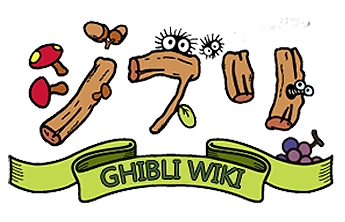mNo edit summary |
mNo edit summary |
||
| Line 55: | Line 55: | ||
*''[[Howl's Moving Castle]]'' (2004) |
*''[[Howl's Moving Castle]]'' (2004) |
||
| − | ==External |
+ | ==External links== |
{{WP2|Tokuma Shoten}} |
{{WP2|Tokuma Shoten}} |
||
| − | ==Navigation== |
||
{{Credits|collapsed}} |
{{Credits|collapsed}} |
||
{{Studio Ghibli|collapsed}} |
{{Studio Ghibli|collapsed}} |
||
| + | |||
[[Category:Companies]] |
[[Category:Companies]] |
||
| + | |||
[[de:Tokuma Shoten]] |
[[de:Tokuma Shoten]] |
||
Revision as of 15:41, 10 September 2021
Tokuma Shoten Publishing Co., Ltd. (株式会社徳間書店, Kabushiki gaisha Tokuma Shoten) is a publisher in Japan, headquartered in Shinagawa, Tokyo. The company was established in 1954 by Yasuyoshi Tokuma in Minato, Tokyo. The company’s product portfolio includes music publishing, video game publishing, movies, anime, magazines, manga and books.
Companies that were part of Tokuma Shoten include Studio Ghibli, Daiei Film and the record label Tokuma Japan Communications. After the founder of the company, Yasuyoshi Tokuma died on September 20, 2000, an asset management occurred. Tokuma Shoten executed a corporate spin-off with Studio Ghibli, turning the company’s anime division as a separate company again in 2005. Tokuma Shoten sold off Tokuma Japan Communications to Daiichi Kosho in October 2001, and Daiei Films was purchased by Kadokawa Corporation in November 2002.
Since 2005, the company has streamlined itself to focus solely on the publication of print media and the airing of its adapted properties to TV and feature film. On 17 March 2017, the company was acquired by Culture Convenience Club. The deal was completed at the end of March.
History
In March 1954, Tokuma was established as East-West Entertainment Publishing in Shimbashi 3-chome, Minato-ku, Tokyo with a capital of 1,000,000 yen. The company took over the publishing rights for Weekly Asahi Performing Arts, a publication which dated back from January 1951. The Osaka branch office opened in the same year. In September 1958, the company’s name was changed to Asahi Performing Arts Publishing. In April 1961, Asahi Performing Arts Publishing spun off their book publishing business as Tokuma Shoten. In October 1967, Asahi Performing Arts Publishing and Tokuma Publishing merged and became known as Tokuma Shoten Company. In the same month, the monthly issue of Problem Novel was launched.
In July 1978, the monthly publication Animage was launched, and in October 1980, the Tokuma Bunko brand was launched. In March 1984, the company co-produced with Hakuhodo Inc. on a project commemorating the company’s 30th Anniversary. The company also funded films by Studio Ghibli, starting with Nausicaa of the Valley of the Wind. In February 1988, the company released the anime series Legend of the Galactic Heroes by Yoshiki Tanaka. On April of the same year, My Neighbor Totoro was released, and in September 1988, the monthly publication GoodsPress was launched.
On 1989, Tokuma Shoten hired Streamline Pictures to produce the English-language version of the 1986 film Castle in the Sky directed by Hayao Miyazaki, and its 1992 English dubbing of The Castle of Cagliostro. In 1988, Streamline also dubbed My Neighbor Totoro and Kiki's Delivery Service, both dubbed under the supervision of Gregory Snegoff for Tokuma Shoten, although this collaboration was only used as in-flight films by Japan Airlines who, at the time, licensed them from Tokuma Shoten. The airline showed the movies during their flights between Japan and the United States. In May 1994, the company launched a children’s picture and literature book as a 40th anniversary commemoration project.
In August 1996, Disney and Tokuma Shoten formed a partnership in which Buena Vista Pictures would be the sole international distributor for Tokuma Shoten's Studio Ghibli animated films. Since then, all three afore-mentioned films by Miyazaki at Studio Ghibli that were previously dubbed by Streamline have been re-dubbed by Disney. On June 1, 1997, Tokuma Shoten Publishing consolidated its media operations by merging Studio Ghibli, Tokuma Shoten Intermedia software and Tokuma International under one location. In February 1999, the 30th anniversary commemorative prize issue novel, was held at the 19th Japan SF award, with a presentation award ceremony of a short novel labelled as Tokuma literary award. In July 2001, Spirited Away was released. It would go on to break numerous records and became the most successful film during that era in Japanese history, grossing over $289 million worldwide.
In November 2004, Howl's Moving Castle was released. Along with the movie, the original book of the same name was a success. Between 1999 and 2005, Studio Ghibli was a subsidiary brand of Tokuma Shoten, however, that partnership ended in April 2005, when Studio Ghibli was spun off from Tokuma Shoten and was re-established as an independent company with a relocated headquarters.
Magazines
- Animage (アニメージュ, Animēju)
Movies
- Nausicaä of the Valley of the Wind (1984)
- Castle in the Sky (1986)
- My Neighbor Totoro (1988)
- Kiki's Delivery Service (1989)
- Only Yesterday (1991)
- Porco Rosso (1992)
- Ocean Waves (1993)
- Pom Poko (1994)
- Whisper of the Heart (1995)
- Princess Mononoke (1997)
- My Neighbors the Yamadas (1999)
- Spirited Away (2001)
- Howl's Moving Castle (2004)
External links
| |||||||||||||||||||
